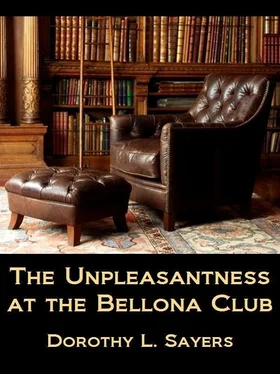“By that time we shall, I hope be moving in different circles. I shall be in the one devoted to murderers and you in the much lower and hotter one devoted for those who tempt others to murder them. I wash my hands of this case, Charles. There’s nothing for me to do now you have come into it. It bores and annoys me. Let’s talk about something else.”
Wimsey might wash his hands, but, like Pontius Pilate, he found society irrationally determined to connect him with an irritating and unsatisfactory case.
At midnight, the telephone bell rang.
He had just gone to bed, and cursed it.
“Tell them I’m out,” he shouted to Bunter, and cursed again on hearing the man assure the unknown caller that he would see whether his lordship had returned. Disobedience in Bunter spelt urgent necessity.
“Well?”
“It is Mrs. George Fentiman, my lord; she appears to be in great distress. If your lordship wasn’t in I was to beg you to communicate with her as soon as you arrived.”
“Punk! they’re not on the ’phone.”
“No, my lord.”
“Did she say what the matter was?”
“She began by asking if Mr. George Fentiman was here, my lord.”
“Oh, Hades!”
Bunter advanced gently with his master’s dressing-gown and slippers. Wimsey thrust himself into them savagely and padded away to the telephone.
“Hallo!”
“Is that Lord Peter? — Oh, good! ” The line sighed with relief — a harsh sound, like a death-rattle. “Do you know where George is?”
“No idea. Hasn’t he come home?”
“No — and I’m frightened. Some people were here this morning…”
“The police.”
“Yes… George… they found something… I can’t say it all over the ’phone… but George went off to Walmisley-Hubbard’s with the car… and they say he never came back there…and… you remember that time he was so funny before… and got lost…”
“Your six minutes are up,” boomed the voice of the Exchange, “will you have another call?”
“Yes, please… oh, don’t cut us off… wait… oh! I haven’t any more pennies… Lord Peter…”
“I’ll come round at once,” said Wimsey, with a groan.
“Oh, thank you — thank you so much!”
“I say — where’s Robert?”
“Your six minutes are up,” said the voice, finally, and the line went dead with a metallic crash.
“Get me my clothes,” said Wimsey, bitterly—“give me those loathsome and despicable rags which I hoped to have put off forever. Get me a taxi. Get me a drink. Macbeth has murdered sleep. Oh! and get me Robert Fentiman, first.”
Major Fentiman was not in town, said Woodward. He had gone back to Richmond again. Wimsey tried to get through to Richmond. After a long time, a female voice, choked with sleep and fury, replied. Major Fentiman had not come home. Major Fentiman kept very late hours. Would she give Major Fentiman a message when he did come in? Indeed she would not. She had other things to do than to stay up all night answering telephone calls and giving messages to Major Fentiman. This was the second time that night, and she had told the other party that she could not be responsible for telling Major Fentiman this, that and the other. Would she leave a note for Major Fentiman, asking him to go round to his brother’s house at once?
Well now, was it reasonable to expect her to sit up on a bitter cold night writing letters? Of course not, but this was a case of urgent illness. It would be a very great kindness. Just that — to go round to his brother’s house and say the call came from Lord Peter Wimsey.
“Who?”
“Lord Peter Wimsey.”
“Very well, sir. I beg your pardon if I was a bit short, but really—”
“You weren’t, you snobby old cat, you were infernally long,” breathed his lordship inaudibly. He thanked her and rang off.
Sheila Fentiman was anxiously waiting for him on the doorstep, so that he was saved the embarrassment of trying to remember which was the right number of rings to give. She clasped his hand eagerly as she drew him in.
“Oh! it is good of you. I’m so worried. I say, don’t make a noise, will you? They complain, you know.” She spoke in a harassed whisper.
“Blast them, let them complain,” said Wimsey, cheerfully. “Why shouldn’t you make a row when George is upset? Besides, if we whisper, they’ll think we’re no better than we ought to be. Now, my child, what’s all this? You’re as cold as a pêche Melba. That won’t do. Fire half out — where’s the whisky?”
“Hush! I’m all right, really. George—”
“You’re not all right. Nor am I. As George Robey says, this getting up from my warm bed and going into the cold night air doesn’t suit me.” He flung a generous shovelful of coals on the fire and thrust the poker between the bars.
“And you’ve had no grub. No wonder you’re feeling awful.”
Two places were set at the table — untouched — waiting for George.
Wimsey plunged into the kitchen premises, followed by Sheila uttering agitated remonstrances. He found some disagreeable remnants — a watery stew, cold and sodden; a basin half-full of some kind of tinned soup; a chill suet pudding put away on a shelf.
“Does your woman cook for you? I suppose she does, as you’re both out all day. Well, she can’t cook, my child. No matter, here’s some Bovril — she can’t have hurt that. You go and sit down and I’ll make you some.”
“Mrs. Munns—”
“Blow Mrs. Munns!”
“But I must tell you about George.”
He looked at her, and decided that she really must tell him about George.
“I’m sorry. I didn’t mean to bully. One has an ancestral idea that women must be treated like imbeciles in a crisis. Centuries of the ‘women-and-children first’ idea, I suppose. Poor devils!”
“Who, the women?”
“Yes. No wonder they sometimes lose their heads. Pushed into corners, told nothing of what’s happening and made to sit quiet and do nothing. Strong men would go dotty in the circs. I suppose that’s why we’ve always grabbed the privilege of rushing about and doing the heroic bits.”
“That’s quite true. Give me the kettle.”
“No, no, I’ll do that. You sit down and — I mean, sorry, take the kettle. Fill it, light the gas, put it on. And tell me about George.”
The trouble, it seemed, had begun at breakfast. Ever since the story of the murder had come out, George had been very nervy and jumpy, and, to Sheila’s horror, had “started muttering again.” “Muttering,” Wimsey remembered, had formerly been the prelude to one of George’s “queer fits.” These had been a form of shell-shock, and they had generally ended in his going off and wandering about in a distraught manner for several days, sometimes with partial and occasionally with complete temporary loss of memory. There was the time when he had been found dancing naked in a field among a flock of sheep, and singing to them. It had been the more ludicrously painful in that George was altogether tone-deaf, so that his singing, though loud, was like a hoarse and rumbling wind in the chimney. Then there was a dreadful time when George had deliberately walked into a bonfire. That was when they had been staying down in the country. George had been badly burnt, and the shock of the pain had brought him round. He never remembered afterwards why he had tried to do these things, and had only the faintest recollection of having done them at all. The next vagary might be even more disconcerting.
At any rate, George had been “muttering.”
They were at breakfast that morning, when they saw two men coming up the path. Sheila, who sat opposite the window, saw them first, and said carelessly: “Hallo! who are these? They look like plainclothes policemen.” George took one look, jumped up and rushed out of the room. She called to him to know what was the matter, but he did not answer, and she heard him “rummaging” in the back room, which was the bedroom. She was going to him when she heard Mr. Munns open the door to the policemen and then heard them inquiring for George. Mr. Munns ushered them into the front room with a grim face on which “police” seemed written in capital letters. George—
Читать дальше












